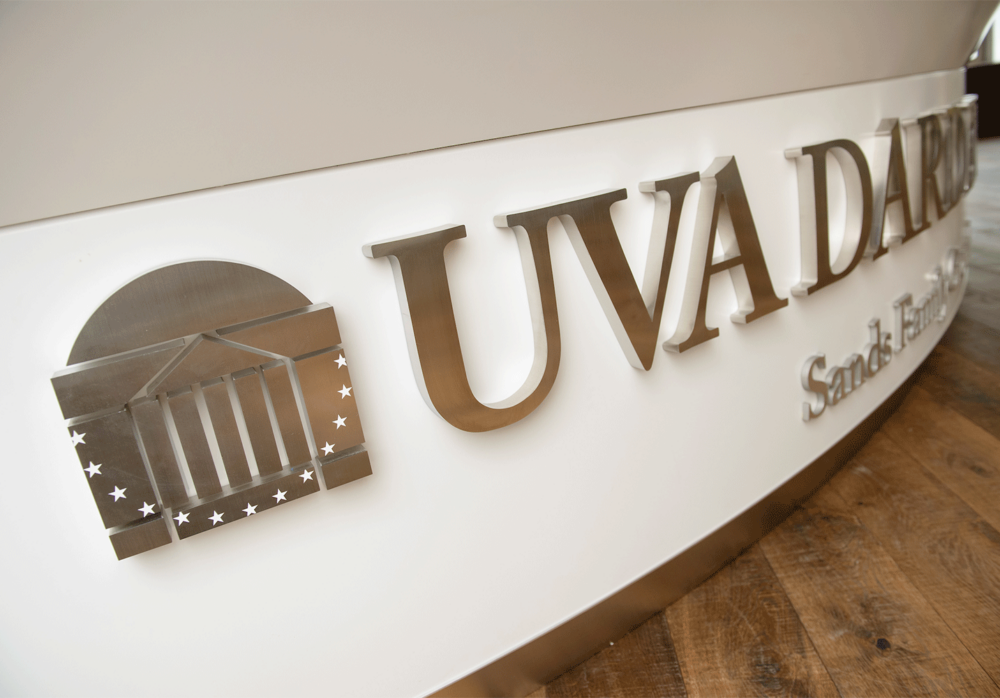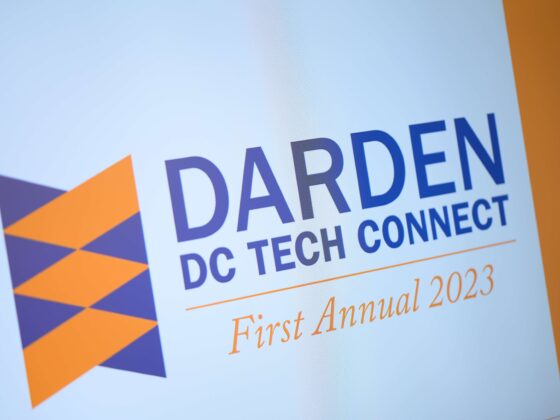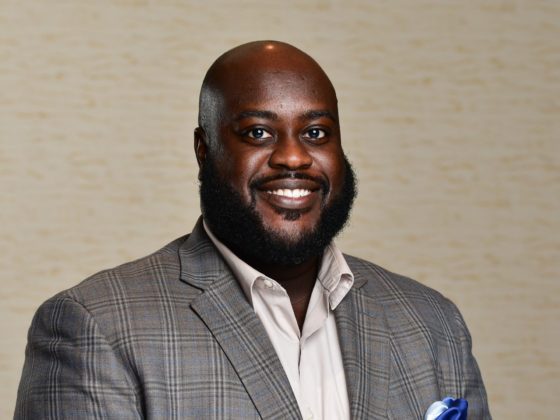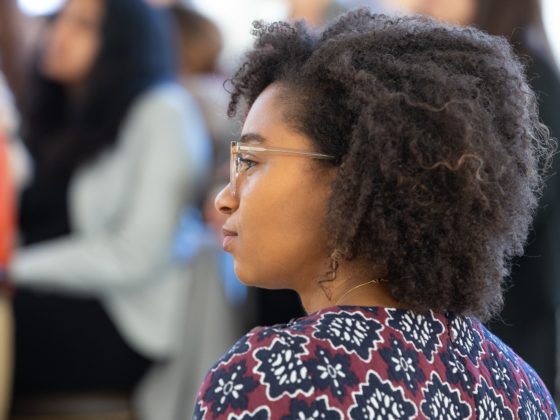After a quiet holiday season, UVA Darden Sands Family Grounds in Arlington, VA came roaring back to life. On Saturday, 13 January, more than 190 in-person and virtual students from the Executive MBA (EMBA) and Part-Time MBA programs attended a full day of 12 panels featuring 55 Darden alumni. This gathering of alumni and professional degree students in such a forum is a first for Darden, offering students an opportunity to hear from and speak with those who have built careers in a variety of industries and functions.
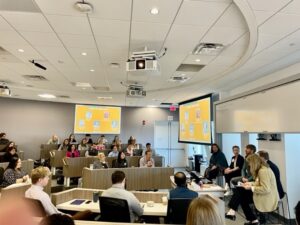
During a day that ran from 9 a.m. to 3 p.m., students networked and gained insights from alumni who shared their experiences in diverse industries such as consulting, energy, government, real estate and investment and asset management. Corporate functions represented included business development and sales, chiefs of staff, finance, general management, marketing, operations and technology. The event marked the culmination of the January term (J-term) Professional Advancement Course (PAC), a key part of the career exploration and planning component of Darden’s professional degree program.
The course is offered to EMBA and Part-Time MBA students during the first J-term of their Darden experience and is currently one of the largest mixed virtual and in-person courses offered by Darden with an enrollment of approximately 200 students.
To better understand how PAC serves the needs of those students, we connected with Director and Executive Coach Jim Collins who has been with Darden for over eight years and plays a central role in the development and delivery of this program to EMBA and Part-Time MBA students.
Describe PAC’s main objectives and its value for students.
EMBA and Part-Time MBA students who come to Darden do so with a primary objective of leveraging the degree to transform their careers in some material fashion. The challenge faced by many of those students is they lack clarity regarding what that professional destination looks like or how they’re going to make that transformation happen. That challenge is complicated by the fact that, while this may be their fundamental objective, they are so consumed with the more immediate and pressing demands of their current jobs, personal lives, and the MBA program that they have no time to work on it.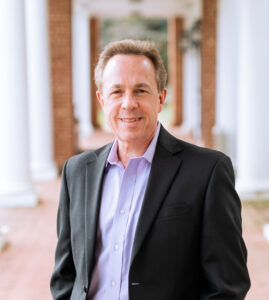
PAC is designed to help address this dilemma and has four objectives. First, it provides a forum which requires students to evolve their thinking about their professional destinations and create a “roadmap” for achieving them during their time at Darden. It introduces them, in a major way, to the Darden alumni community and enables them to significantly expand their networks within it. It also enables the students to make major strides in exploring alternative career paths. And finally, it makes a substantive contribution to building the professional advancement “learning community” to support their career journeys while in the program.
How does the PAC address the unique career needs of EMBA and Part-Time MBA students?
One of the fascinating things about professional degree students is their tremendous diversity. They come from a multiplicity of industries and functions. They range widely in terms of experience and stage of career as well as the professional directions in which they are headed. While we can loosely categorize them as “Switchers”, “Climbers”, “Entrepreneurs” or “Enhancers”, the truth is, each is pursuing his or her own unique career quest.
This is the challenge which PAC aims to get its arms around. It is designed as a course that enables each, in a very personal way, to open their aperture and think more broadly about their career options, expand their thinking about their professional destinations, and establish action plans to reach them. Whatever path they choose to pursue upon graduation, our hope is that they are able to make that choice from a far more informed standpoint.
So how does PAC do this? Walk us through the basic structure of this two-week course.
Week 1 is designed to ease the students back into the academic routine following the holiday break and introduce them to panels of alumni who have pursued a variety of “switching”, “climbing”, and “entrepreneurial” journeys during their time at Darden. The intention here is to allow the students not only to hear about the various career quests of those former students, but to begin thinking seriously about how their own journeys might unfold.
Week 2 is composed of three evening classes where the students move into action planning for those career journeys. In the context of large group discussions and small group breakout sessions, they work to share ideas and flesh out the various components of their action plans. This includes, defining their current state and their personal brand, outlining their potential destinations, and expanding their thinking about the things they will need to learn and the relationships and networks they will need to establish to reach them.
The course culminates with the in-person “Career Exploration Forum” in which students are exposed to multiple alumni panels discussing career paths within a broad spectrum of industries and functions. Following that, students sign up for an appointment with one of Darden’s career coaches where they have an opportunity to discuss and fine tune their action plans, get help identifying sources of support and network connections, and commit to “next steps” to advance their careers.
Tell us more about the PAC Career Exploration Forum. What’s your perspective on that component of the course?
This is the first year we’ve had an event of this scale or scope. In the past, the Career team organized “one-off” panel sessions on specific career options. For example, we hold regular consulting or tech panels with alumni and schedule these wherever possible, into the busy MBA program schedules. In the course of any given year, we might conduct five or six. Students always found them to be of value, but they were limited.
With the introduction of J-term, the combining of the EMBA and Part-Time MBA populations in one course, and the dedication of time with no competing MBA programming, we were able to radically expand this program concept.
As you’ve mentioned, we had 11 panels with more than 55 alumni that focused on a broad spectrum of industries and functions, as well as an additional panel of veterans for students who were exploring their post-military transitions. There was also a networking luncheon and opportunities between sessions for students to connect with panel members. Those in the DC metro area attended in person, but there was also a virtual option for non-local students. In all, we received a fantastic response to this event and positive feedback from students on its relevance and value.
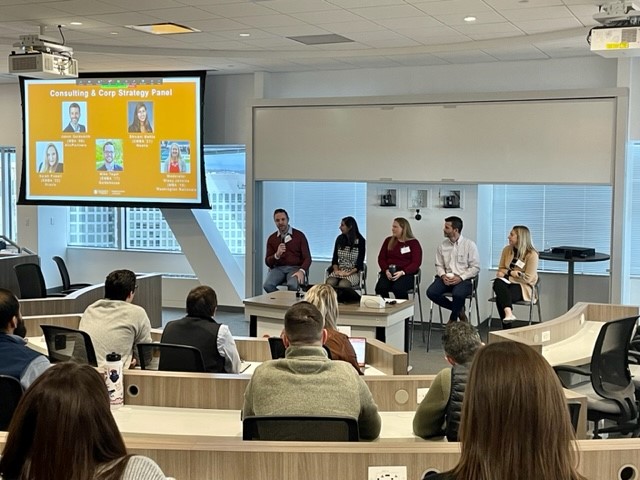
Thanks for your insights and your time, Jim!
Find out more about the Darden Executive MBA and the Part-Time MBA formats. Applications are currently being accepted for the Part-Time MBA Class of 2027 and Executive MBA Class of 2026.

